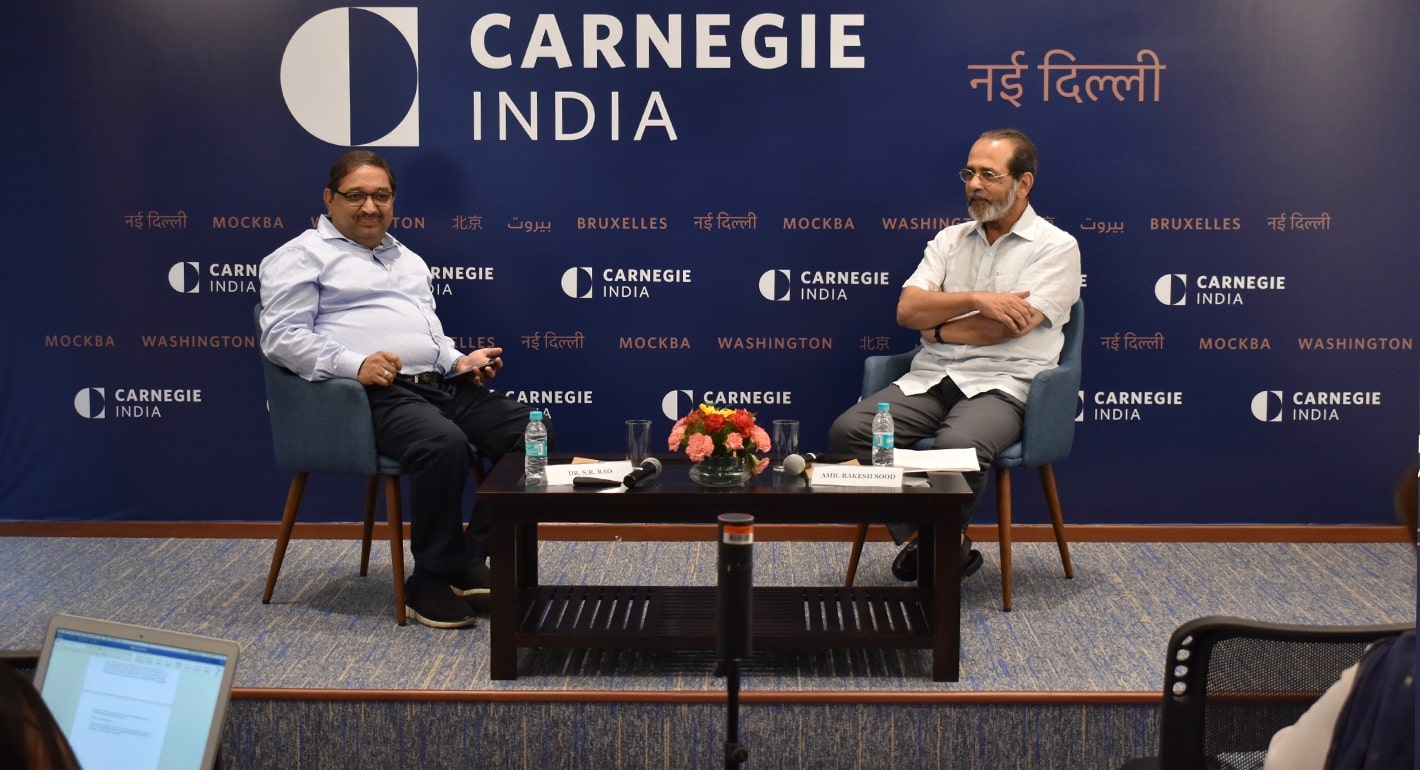Registration
You will receive an email confirming your registration.
IMGXYZ8386IMGZYX
KnowledgeTransfer@CarnegieIndia is an initiative that aims to provide a platform to facilitate the genuine exchange of ideas and knowledge among students, practitioners, subject-matter experts, and other interested audiences.
Gene editing has the potential to revolutionize the societies that we live in and the organisms that we live alongside. The experiment by He Jiankui, a Chinese researcher who claims to have produced genetically altered babies, has polarized the scientific community, and brought the potential benefits and pitfalls of gene editing into sharp focus—both in India and the world.
Carnegie India hosted Vijay Chandru, co-founder and director of Strand Life Sciences, for a discussion on gene editing technology and its applications in human therapeutics. This introductory session was followed by a conversation on the governance frameworks for gene editing, with S.R. Rao, former senior advisor to the Department of Biotechnology at the Ministry of Science & Technology, and Rakesh Sood, distinguished fellow at the Observer Research Foundation.
DISCUSSION HIGHLIGHTS
- The Genomics Revolution: Participants noted that the Human Genome Project, an exercise to sequence and map all human genes, has provided the ability to read the human genetic blueprint. Low-cost human genome sequencing is improving ability of human beings to diagnose, treat, and prevent diseases, stated participants. They highlighted that, since every genome is unique, genetic information from an individual can be used to drive the world toward an era of personalized medicine—a scenario where patients are prescribed medicines based on their genetic profiles.
- Gene Editing and its Applications: Gene editing is the deliberate insertion, deletion, or replacement of a DNA sequence in the genome of a living cell, explained participants. They stated that it uses a certain set of proteins called nucleases that make precise, targeted cuts in the DNA. They further noted that zinc finger nucleases (ZFNs) and Transcription Activator-Like Effector Nucleases (TALENs) have been effectively used to edit genes in a wide variety of tissues and organisms. The discovery of CRISPR/Cas9, an adaptive version of the bacterial defense mechanism, the participants added, allows scientists to edit, cut, and replace genes more quickly, efficiently, and inexpensively than previous gene editing tools. They noted that it has the potential to alter any DNA sequence, whether in bacteria, plants, animals, or humans—in theory if not yet in practice. While acknowledging that gene editing has limitless applications across living organisms, participants primarily discussed its applications on somatic or non-reproductive cells to prevent and treat human diseases such as sickle cell anemia, muscular dystrophy, Huntington’s disease, thalassemia, and cancer.
- Safety, Security, and Ethics of Gene Editing: Participants highlighted that, while somatic cell therapies have targeted effects on specific organs and are not passed down to future generations, editing the human germline or reproductive cells entails changes to the heritable DNA. Ethical concerns that germline gene editing may be used for non-therapeutic purposes or genetic enhancement brings into sharp focus the possible pitfalls of gene editing, stated participants. He Jiankui’s experiment claims to have used CRISPR/Cas9 technology to create genetically altered babies, making them resistant to HIV, and enhanced the their cognition and memory, noted participants. While there is no evidence that He wanted to modify the babies’ intelligence, the unintended consequences of such an experiment raise serious safety concerns. Recent advancements in gene editing also have serious implications for national and international security. CRISPR/Cas9 can modify pathogens to increase their virulence, expand their host range, increase their transmissibility, and enhance natural resistances to therapeutic interventions, added participants. In the United States, scientists are developing Anti-CRISPR techniques to minimize the effects of CRISPR/Cas9 gene editing, noted participants.
- Governance of Gene Editing: Given the safety, security, and ethical implications of gene editing, participants highlighted the need to govern gene editing applications. They noted the necessity of separate regulations for genetic modification—a technique that adds foreign DNA to a genome—and gene editing—a tool that only changes the existing DNA sequence. However, current regulatory systems in most countries, and particularly India, are characterized by divided roles and responsibilities based on the diverse applications of gene editing rather than an integrated, coordinated system, highlighted participants. Since public consensus on gene editing will be relevant within each individual country, participants highlighted the importance of communicating relevant scientific, ethical, regulatory, and political information on gene editing advancements within societies. Though different nations have different laws, guidelines, and regulations governing gene editing, the participants emphasized the importance of a global framework for oversight to prevent irresponsible and unacceptable applications of gene editing. As a starting point, the World Health Organization (WHO) has set up a new advisory committee to develop global standards for the governance and oversight of human genome editing, noted participants. While the WHO committee has called for the creation of a new transparent global registry to monitor human genome editing, participants highlighted the need for countries to develop a uniform format to register all human gene editing experiments in their individual countries.
This event summary was prepared by Shruti Sharma, a research analyst with the Technology and International Affairs Program at the Carnegie Endowment for International Peace.
Agenda
10:00 to 11:30 a.m.
Introduction to Gene Editing and its Governance in India
- Vijay Chandru, co-founder and director, Strand Life Sciences
11:30 to 11:45 a.m.
Coffee Break
11:45 to 1:00 p.m.
Global Architecture for the Governance of Gene Editing
- S.R. Rao, former senior advisor, Department of Biotechnology, Ministry of Science & Technology
- Rakesh Sood, distinguished fellow, Observer Research Foundation




